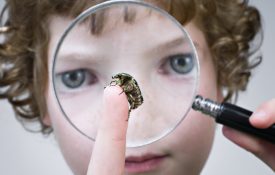-
The Inside Story On The Fear Of Holes
NPR: Trypophobia may be moving out of the urban dictionary and into the scientific literature. A recent study in the peer-review journal Psychological Science takes a first crack at explaining why some people may suffer from a fear of holes. Trypophobia may be hard to find in textbooks and diagnostic manuals, but a brief Web search will show that plenty of people appear to have it. There's even a website, trypophobia.com, that explains the problem like this: "Have you ever felt anxious when you see a hole in the road or a pot? Or are you nervous when someone will bring a cheese with lots of holes in front of you? If yes, you might have trypophobia." But why?
-
In This Online Psychology Class, the Key Words Are Real Time
The New York Times: Before they took their seats in front of the camera under the warm lights of a new studio, Sam Gosling reminded his co-host, James Pennebaker, the chairman of the psychology department at the University of Texas at Austin, to run down the hall and apply his makeup. ... Introduction to Psychology was about to go live online as a synchronous massive online course. “The territory is so new here,” Mr. Gosling, a tenured professor, said the next morning.
-
Study shows NFL fans get fatter after their team loses
CBS Sports: Keep a close eye on your cholesterol, Raiders fans. A new study shows that fans of losing NFL teams tend to be more obese than fans of winning teams. Via For the Win's Nate Scott, we learn of Pierre Chandon, the L'Oreal Chaired Professor of Marketing, Innovation and Creativity at INSEAD Business Schoool, and his study of NFL fans and their chunkalicious responses to defeat. “One day after a defeat, Americans eat 16 percent more saturated fat, and 10 percent more calories," Chandon writes. "But on the day after a victory of their favorite team, then it's the opposite. They eat more healthily. They eat 9 percent less saturated fat, and 5 percent fewer calories.
-
Days late, dollars short
The Economist: There is a distinctive psychology of scarcity, argues Mr Mullainathan and Eldar Shafir, a psychologist at Princeton University. People’s minds work differently when they feel they lack something. And it does not greatly matter what that something is. Anyone who feels strapped for money, friends, time or calories is likely to succumb to a similar “scarcity mindset”. This mindset brings two benefits. It concentrates the mind on pressing needs. It also gives people a keener sense of the value of a dollar, minute, calorie or smile. The lonely, it turns out, are better at deciphering expressions of emotion. Likewise, the poor have a better grasp of costs.
-

Everyday Sadists Take Pleasure In Others’ Pain
People who score high on a measure of sadism seem to derive pleasure from behaviors that hurt others, and are even willing to expend extra effort to make someone else suffer, a study shows.
-
Perspectives Looks Back Over 25 Years of Science
As APS celebrates its 25th anniversary, the journal Perspectives on Psychological Science is featuring a series of special sections that take a look at how the field has changed over the last 25 years. The special section in the September issue includes articles that explore psychology as a multilevel science, advances in eyewitness science, the emergence of relationship science, and developments in the area of cognitive psychology. 25 Years Toward a Multilevel Science Marilynn B.

